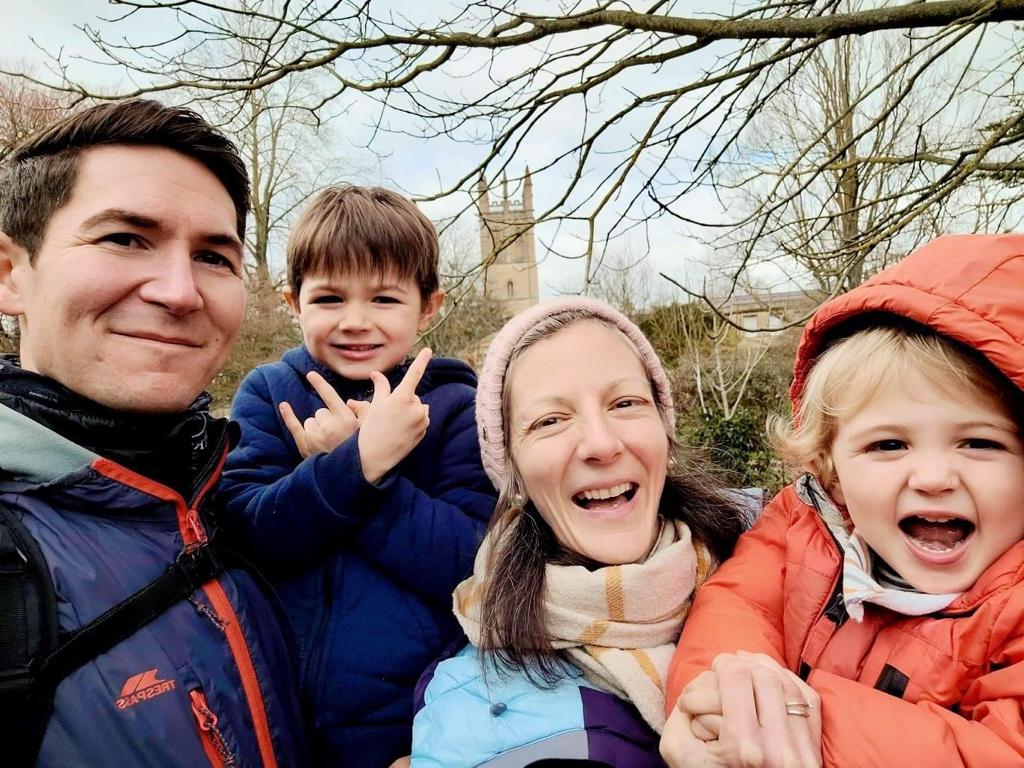
My 2.5-year journey with translocation renal cell carcinoma
April 30, 2024
This is a guest post by Dawn Dyson, 37, who was diagnosed with translocation renal cell carcinoma in 2022. Dawn…
Read More
By D’Ann George, PhD, Medical Writer
For ten years, Dr. Jose Karam, a urologist at MD Anderson Cancer Center, looked forward to receiving Paul Laudadio’s Christmas card. Though many expressions of gratitude decorated his office – letters, drawings, watercolors, and even a purple kidney-shaped stuffie – Laudadio’s card stood out. The multi-fold design featured all 35 members of his former patient’s extended, multi-generational family, dressed in color-coordinated shirts – a different color for each family belonging to his six children.

So when he didn’t get a card in the mail last year, Karam worried a little.
Ten years earlier, Laudadio chose Karam to perform his cytoreductive nephrectomy, a surgical procedure that does not cure metastatic kidney cancer on its own but can pave the way for more treatment with systemic therapy.
Karam recommended the surgery for Laudadio for several reasons.
“He was young, in excellent health, his kidney tumor was large, his tumor burden was limited to the abdomen, and surgery could remove more than 90% of the tumor present in his body,” he said.
Karam, who is also a member of the KCA’s Medical Steering Committee, made the recommendation after discussing Laudadio’s cancer with Dr. Eric Jonasch, a genitourinary medical oncologist at MD Anderson. Such multidisciplinary consultations are very important when forming a treatment plan for metastatic kidney cancer, he noted.
At that time, in 2012, Laudadio was 65 years old and living a busy life. After working for Gulf Chemicals and Chevron, he started his own company to produce raw materials for plastic products ranging from trash bags to computer housing. And he exercised avidly to keep himself fit.
Feeling himself younger than his years, he found it hard to believe when an ultrasound during an executive health exam revealed a mass on one of his kidneys, leading to an eventual diagnosis of metastatic renal cell carcinoma (RCC).
“I was surprised [the physician] found a mass on me when I’ve been healthy, used to run every day, swim a mile three days a week. I’ve never had a symptom of this illness–this cancer. Never had blood in the urine and I’ve never had a symptom. I’m not your typical patient,” he said.
Nevertheless, Laudadio did not hesitate to schedule his surgery.
“I’ve always been under the impression that, you know, my life’s in God’s hand. I’m not in control. I look at things very objectively and unemotionally. I felt like if we needed to do the surgery, let’s get our schedule and get it in and let’s get it done,” he said.
Cytoreductive nephrectomy can be a viable option in cases where removing a majority of the tumor tissue from the affected kidney offers the chance at increased survival, as Karam noted, especially if the tumors respond to systemic therapy such that the metastases shrink or are kept stable. Deciding who is a good candidate for this type of surgery was dependent on a variety of risk factors but more recent data is refining the selection process through factors like the amount of tumor tissue, anemia, and immune activity.
The night before the surgery, his children and grandchildren threw a “pre-operation celebration” for him.
“Each family gave me a set of pajamas and then they had a feast, even though I couldn’t eat or drink a thing,” he said, laughing. “We’re a really close family.”
His wife, Daphne, stayed with him in the hospital.
“She took care of me just like I’ve taken care of her during some of her illnesses,” he said.
The cytoreductive nephrectomy surgery went well, removing the bulk of the kidney tumor. A residual amount of disease remained on his pancreas, however, requiring treatment.
Laudadio began a course of everolimus, a targeted therapy approved for advanced renal cell carcinoma in 2009. After beginning a dose that landed him in the hospital due to complications, his care team cut his dose in half, an amount that he has tolerated for more than a decade because it keeps his disease stable. He gets a sore in his mouth from the drug about every three weeks, he said.
“My oncology doctor said [that] in ten years there have been other advances [over everolimus], but right now your quality of life is good. I see no reason to yank you off because there are side effects,” Laudadio said. “I go back now [to an oncologist] once every six months and we just kind of monitor the growth.”
Jonasch, his medical oncologist, said that it is rare for patients to be long-term responders to everolimus.
“I have had a few patients in addition to Mr. Laudadio who have enjoyed similar magnitude of benefit from this agent,” he said. “Certain tumor mutations, particularly in the P13K pathway, portend for a better outcome on everolimus.”
Today, oncologists more typically use everolimus in combination with lenvatinib, another targeted therapy, than alone, Jonasch noted.
Now 76 years old, Laudadio still swims several times a week and takes his whole family on a yearly vacation. In the past, they have gone to Costa Rica, where they hired professional dancers to come and teach them a local dance. This year, they will try fly fishing and horseback riding in Utah.
In his rich, full life, Laudadio has not forgotten Karam. The missing Christmas card was simply due to a change of address.
“I’ll send him another one,” Laudadio said.